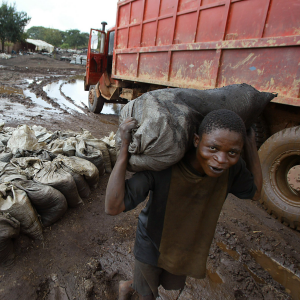Apple, Microsoft, Samsung, Sony and Vodaphone as well as Daimler and Volkswagen are among the household brands failing to do basic checks to ensure that cobalt mined in the Democratic Republic of the Congo (DRC), where child labour is rife, has not been used in their products, claim Amnesty International and Afrewatch in a report published today.
"Companies whose global profits total $125bn (£86.7bn) cannot credibly claim that they are unable to check where key minerals in their productions come from," said Mark Dummett, business and human rights researcher at Amnesty International.
The report, ‘This is what we die for: Human rights abuses in the Democratic Republic of the Congo’ power the global trade in cobalt, traces the sale of cobalt, used in lithium-ion batteries, from mines where adults and children as young as seven work in perilous conditions.
The paper documents how traders buy cobalt from areas where child labour is present and sell it to Congo Dongfang Mining (CDM), a wholly-owned subsidiary of Chinese mineral giant Zhejiang Huayou Cobalt Ltd (Huayou Cobalt).
The human rights group’s investigation uses investor documents to show how Huayou Cobalt and its subsidiary CDM process the cobalt before selling it to three battery component manufacturers in China and South Korea. They then sell to battery makers who supply technology and car companies, including Apple, Microsoft, Samsung, Sony and Vodaphone as well as Daimler and Volkswagen.
As part of the joint investigation with African Resources Watch (Afrewatch), an NGO focusing on human rights in the mineral and extractive industry, Amnesty International contacted 16 multinationals who were detailed as customers of the battery manufacturers listed as sourcing processed ore from Huayou Cobalt.
One company admitted the connection, while four were unable to say for certain whether they were buying cobalt from the DRC or Huayou Cobalt. Six said they were investigating the claims. Five denied sourcing cobalt via Huayou Cobalt, though they are listed as customers in the company documents of battery manufacturers. Two multinationals denied sourcing cobalt from DRC.
Crucially, says the report, none provided enough details to independently verify where the cobalt in their products came from.
The DRC produces 50 per cent of the world’s cobalt. Huayou Cobalt gets more than 40 per cent of its cobalt from the DRC.
“Considering the predominance of cobalt from the DRC in the global market, it is unlikely that all these large companies are not sourcing any cobalt from the DRC,” says the report.
UNICEF estimated in 2014 that 40,000 boys and girls work in mines across southern DRC, many of them involved in cobalt mining.
Children interviewed for the report by Amnesty International across five artisanal cobalt mines said they worked for up to 12 hours a day, carrying heavy loads, and earned between one and two dollars a day. As with adult miners the children were exposed to high levels of cobalt on a consistent basis, and wore no gloves or facemasks. The children interviewed for the report complained of being frequently ill.
Apple Inc, who turned over US $233.7 billion in 2015, have answered “currently under evaluation” when questioned whether the company’s cobalt products originate in the DRC or whether CDM or Huayou process cobalt is within the company’s supply chain.
“We are currently evaluating dozens of different materials, including cobalt, in order to identify labour and environmental risks as well as opportunities for Apple to bring about effective change,” they say.
Likewise, Microsoft, according to the Amnesty report, is “is unable to say ‘with absolute assurance’ whether or not cobalt in its products originates in Katanga in the DRC.”
“Tracing metals such as cobalt up through multiple layers of our supply chain is extremely complex,” they say.
“Tracking the origin of cobalt metal in [the different compounds used in Microsoft products] to the precise mining area is extremely challenging.”
There is currently no regulation of the global cobalt market. Cobalt does not fall under existing “conflict minerals” rules in the USA, which cover gold, coltan/tantalum, tin and tungsten mined in DRC.
KEEP UP TO DATE ON TWITTER AND FACEBOOK...
Follow all the latest news and events from the Catholic world via The Tablet's Twitter feed @the_tablet
Or you can join in the debate at our community page on Facebook




 Loading ...
Loading ...